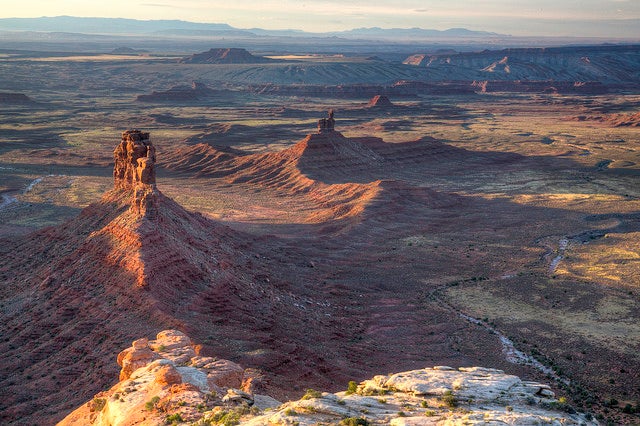‘No New Parks’ Bill Ignores the Will of the American People
Rep. Rob Bishop's bill misses the mark on the role protected national monuments and national parks play in the lives of everyday Americans.

This page was published 8 years ago. Find the latest on Earthjustice’s work.
National monuments are stunning federal lands and ocean areas that hold our history, our cultural treasures, iconic wildlife and scientific wonders — all permanently protected by 16 presidents over the last 111 years.
Considering how dearly the American people value our iconic public lands and waters, you’d think that the Antiquities Act and the county’s national monuments would be safe from the incursions of private industry.
But that is not the case.
To read the language of the National Monument Creation and Protection Act, recently introduced in the House by Rep. Rob Bishop (R-Utah), is to read a bill that misses the mark on the role protected national monuments and national parks play in the lives of everyday Americans.
These unique lands and waters protected under the Antiquities Act already belong to all of us. They are part of our historic, our scientific, and yes, our wild heritage. They are where we go to escape with friends and family, to find wonder in wild open spaces, and to connect with our history.
But the recent attacks on national monuments, from President Trump’s executive order, to Interior Secretary Ryan Zinke’s hasty and arbitrary review of these magnificent places, to Bishop’s slapdash bill to gut the Antiquities Act, are a smokescreen for other uses of these special places entirely.
Instead of a dinosaur wonderland and tourism boon in Grand Staircase-Escalante, Zinke and Utah’s delegation see a new coal mine. Instead of Bears Ears’ vast archeological record and priceless lands sacred to over five Native American tribes, they see oil and gas drilling. In the Atlantic waters of the Northeast Canyons home to whales and ancient corals, they see only a commercial fishery.
Bishop’s agenda-driven bill is a non-starter, unflinching in its lack of compromise. While the Antiquities Act that has been law of the land for over a century grants presidents the power to protect federal lands and waters, Bishop’s radical rewrite would allow presidents to act unilaterally to help private interests profit from exploiting oil, gas and other resources on sensitive federal lands.
It isn’t clear how Bishop’s plans to gut the Antiquities Act could be primarily about transparency, when he has a history of working to turn over federal public lands to the states and open them up to fossil fuel interests.
Coal is dying — it can’t compete. Oil and gas should go that way too in face of renewable energy’s inexorable growth and promise. When the dust clears, will we find that we’ve given away a heritage that belonged to all of us to a few special interests? A few short years is all it takes to give us stumps in the place of an old growth forest.
Congress found great reason, over a century ago, to grant presidents the authority to protect the federal lands and waters that play an important role in our heritage. The Antiquities Act undergirds our system of public lands and waters, providing a legal framework to protect the special places that should go to our children, and our children’s children, as national monuments.
And furthermore, they’ve been a quintessential American success story: Economic research shows that national monuments support the growth of local economies, bringing in tourism and recreation dollars and boosting the quality of life. The Outdoor Industry Association reported this year that public lands help support 7.6 million jobs in America, and $887 billion in outdoor recreation activity.
Bishop and his supporters may claim that his bill is about public engagement and transparent processes, but the American people have already made their will known.
Just this summer, 2.8 million Americans raised their voices in support of keeping our national monuments protected just as they are. That made Zinke’s national monuments public comment period the largest public comment period in the history of the Interior Department.
Across the West, public support for protecting our national monuments has proven strong, and a significant majority of Western voters oppose more mining and drilling on public lands.
Members of Congress from across the nation continue to raise their voices, standing up for the Antiquities Act and our national monuments while fighting to hold this administration accountable for its destructive actions.
Transparency is a convenient argument. But the true picture of what’s unfolding for the country’s national monuments is clear as day, and the American people have been paying attention. Bishop’s bill to dismantle the Antiquities Act should follow the same path as his previous attempts to undermine public lands protections — radical proposals never signed into law.
A version of this piece first appeared as an op-ed in The Hill.
Established in 1989, Earthjustice's Policy & Legislation team works with champions in Congress to craft legislation that supports and extends our legal gains.